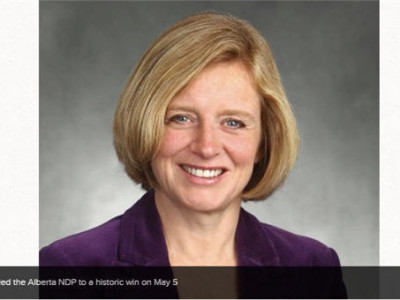Why Alberta’s Carbon Tax Matters
Combating Climate Change Will Require Reversing Three-Decade Trend of Political Economy

While Americans were preparing for our Thanksgiving, in the Great White North, a major new development occurred: the NDP (i.e. Social Democratic) government in Alberta — Canada’s major energy-producing province — announced an economy-wide carbon tax starting in 2017 and a cap on emissions from oil sands.
This would be an aggressive move anywhere in the developing world: in Alberta, Canada’s most conservative province, it is quite radical. Premier Rachel Notley deserves a lot of credit for political courage. New measures include:
- A 100-megatonne cap on carbon emissions from the oil sands, Canada’s fastest-growing source of emissions, once new rules are adopted. It currently emits 70 megatonnes annually.
- An economy-wide tax of $20 per tonne on carbon-dioxide emissions starting in 2017, rising to $30 in 2018. Equal to seven cents per litre of gasoline, the average household will see heating and transportation costs increase by $470 annually by 2018.
- Incentives to have nearly one-third of power generated from renewables such as wind and solar by 2030.
But perhaps more importantly than the substance are the politics. Notley has shown skill as well as courage. As the Globe and Mail noted:
Energy leaders had previously warned any onerous new costs would be disastrous for an industry under severe financial pressure.
Still, Suncor Energy Inc. chief executive Steve Williams, Shell Canada head Lorraine Mitchelmore, Cenovus Energy Inc. CEO Brian Ferguson and even Canadian Natural Resources Ltd. chairman Murray Edwards, who had been among the sharpest critics of the NDP’s economic policies, stood with Ms. Notley and environmental groups to endorse the moves.
“This plan will position Alberta, one of the world’s largest oil and gas producing jurisdictions, as a climate leader and will allow for ongoing innovation and technology in the oil and gas sector,” said Mr. Edwards, the Calgary-based oil man, financier and sports-team owner.
The Globe and Mail does not report how a socialist whose party does not figure to be re-elected in a conservative province got energy companies on board, but it appears to be a remarkable political feat. True, with a new Liberal government in Ottawa that is committed to aggressive climate policy, Notley had some good political winds at her back. But not that good: she does not belong to the Liberal Party, and sometimes opponents will double down on policy and try to get governments to compromise in their direction.
The business presence at a conference announcing environmental taxes would not have seemed strange even in America until the 1980’s. As historians, most notably Kimberley Phillips-Fein, have noted, business moved sharply rightward in the late 1970’s. Earlier, US business was center-right, represented most prominently by the impeccably center-right Business Roundtable. Historians of environmental law will note that the Clean Air Act passed the United States Senate in 1970 with a unanimous vote. But in the late 1970’s, business allied itself with Movement Conservatism, and began opposing even moderate regulation: the debacle of proposed labor law reform in 1978 signalled a major turning point.
This hardly represented a rational response to market forces. It is not as if business did poorly during the postwar period, and much of what passes for the business sector now is in finance, which has no necessary dog in the climate fight. Instead, it is ideological, created by a cluster of right-wing ideas. When last year Thomas Perkins, a hedge fund billionaire, compared criticism of Wall Street to Kristallnacht, he was not doing so because of rational business strategy.
If a robust coalition to combat and adapt to climate change will be created, somehow the business community, in all its diversity, will have to be brought back to its earlier philosophical posture. It can be done: there are lots of great business opportunities in fighting climate change, regulatory certainty helps long-term investment, and even businessmen should not want to see the planet melt. But a more coherent strategy will help, and Notley is someone to ask. Perhaps high-level conferences should be arranged not in Jackson Hole, but Banff.

Reader Comments
2 Replies to “Why Alberta’s Carbon Tax Matters”
Comments are closed.







Jonathan said;
“….A 100-megatonne cap on carbon emissions from the oil sands, Canada’s fastest-growing source of emissions, once new rules are adopted…..”
Dear Jonathan,
It appears that Alberta’s proposed carbon tax scheme has not yet been fully adopted and faces opposition. In light of the Paris conference, we should also point out that an international climate treaty has not yet been adopted. Presently, neither the tax nor the treaty are legally binding (and likely never will be). In less than two weeks we should know the fate of the climate treaty. Do you regret not being in Paris?
perhaps the business community began opposing regulatory measures for rational reasons like not wanting to spend 7 years in an endless NEPA review before being able to move forward with a project? Not everything comes down to ideology. Although it is a nice straw man.